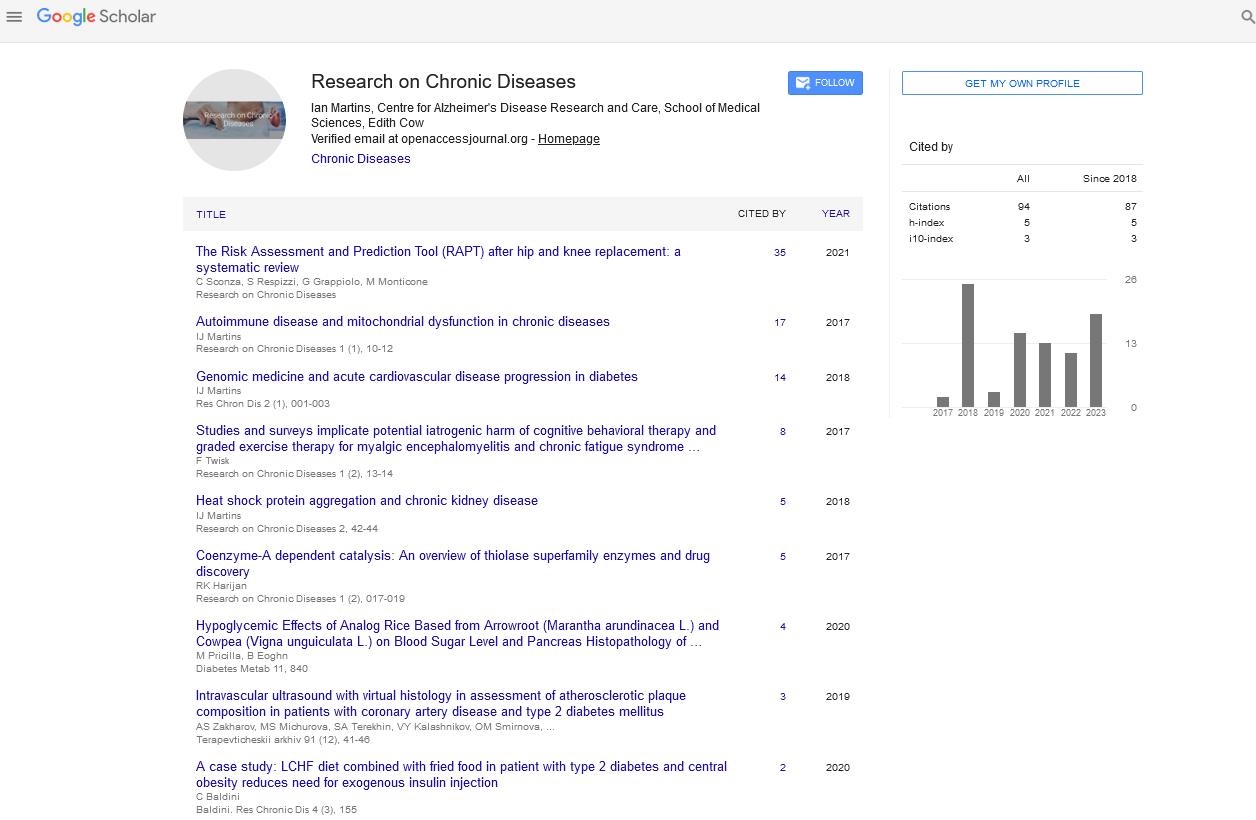Perspective - Research on Chronic Diseases (2023) Volume 7, Issue 6
Chronic Renal Failure: Understanding, Managing, and Living with Kidney Health Challenges
- Corresponding Author:
- Chich-Hsiu Hung
Department of Nephrology, Korea University, Seoul, South Korea
E-mail: hung@edu.tw
Received: 06-Nov-2023, Manuscript No. OARCD-23-119479; Editor assigned: 08-Nov-2023, PreQC No. OARCD-23-119479 (PQ); Reviewed: 22-Nov-2023, QC No. OARCD-23-119479; Revised: 29-Nov-2023, Manuscript No. OARCD-23-119479 (R); Published: 06-Dec-2023, DOI: 10.37532/OARCD.2023.7(6).117-118
Introduction
Chronic renal failure, also known as Chronic Kidney Disease (CKD), is a prevalent and progressive condition affecting millions worldwide. The kidneys, vital organs responsible for filtering waste and excess fluids from the blood, gradually lose function over time in CKD. This article aims to provide insights into the complexities of chronic renal failure, its causes, impact on health, management strategies, and ways individuals can lead fulfilling lives while dealing with this condition.
Navigating chronic renal failure
Understanding chronic renal failure: Chronic renal failure or CKD is a condition characterized by the gradual loss of kidney function over an extended period. The kidneys’ ability to filter waste and maintain electrolyte balance decreases, leading to a buildup of waste products in the body.
Stages of chronic kidney disease: CKD progresses through stages, from mild (stage 1) to severe (stage 5). These stages are determined by the Glomerular Filtration Rate (GFR), a measure of how well the kidneys are filtering blood. As CKD advances, symptoms become more pronounced and complications more severe.
Causes and risk factors
Underlying causes: Various factors contribute to the development of chronic renal failure, including high blood pressure, diabetes, glomerulonephritis, polycystic kidney disease, urinary tract problems, and prolonged obstruction of the urinary tract.
Risk factors: Certain lifestyle and health-related factors, such as obesity, smoking, older age, family history of kidney disease, and cardiovascular disease, increase the risk of developing CKD.
Description
Impact on health and daily life
Symptoms and complications: Early stages of CKD may not exhibit noticeable symptoms. As the disease progresses, symptoms like fatigue, swelling, changes in urination patterns, nausea, and shortness of breath may become more apparent. Additionally, CKD can lead to complications such as anemia, bone disease, cardiovascular issues, and fluid retention.
Quality of life challenges: CKD significantly impacts an individual’s quality of life. Fatigue, discomfort, dietary restrictions, and the need for frequent medical appointments can lead to emotional distress, anxiety, and depression. Adjusting to these lifestyle changes while managing the disease is challenging for many.
Diagnosis and treatment
Diagnosis: Diagnosing CKD involves a series of tests, including blood tests to measure creatinine levels and estimate GFR, urine tests to check for protein and blood, imaging tests, and kidney biopsies in certain cases.
Treatment approaches: Treatment focuses on slowing the progression of the disease, managing symptoms, and preventing complications. This may involve lifestyle changes, medication to control blood pressure, lower cholesterol, and manage anemia, and in later stages, renal replacement therapy such as dialysis or kidney transplantation.
Living with chronic renal failure
Lifestyle modifications: Individuals with CKD can benefit from adopting healthy lifestyle practices, such as maintaining a balanced diet with reduced sodium and phosphorus intake, staying hydrated, regular exercise, and avoiding tobacco and excessive alcohol consumption.
Mental and emotional well-being: The emotional toll of dealing with chronic illness can be significant. Seeking support from family, friends, or support groups, along with professional counseling, can help individuals cope with the challenges and uncertainties associated with CKD.
Financial and social impact: CKD can have substantial financial implications due to the cost of treatment, medications, and possible reduced ability to work. It can also affect social interactions and relationships due to lifestyle changes and the need for medical attention.
Prevention and management strategies
Preventive measures: Prevention is vital in managing CKD. Managing underlying conditions such as diabetes and hypertension, regular monitoring of kidney function, and early intervention to address kidney issues are crucial in preventing CKD progression.
Managing progression: Regular medical check-ups, compliance with prescribed medications and treatment plans, and proactive lifestyle changes can significantly slow the progression of CKD and reduce complications.
Conclusion
Chronic renal failure, a progressive and potentially life-altering condition, poses significant challenges to individuals and their families. Understanding the causes, symptoms, and available management options is crucial for coping with the complexities of CKD. While the journey with chronic kidney disease may be daunting, proactive management, healthy lifestyle choices, emotional support, and proper medical guidance can empower individuals to lead fulfilling lives despite the presence of this condition. Enhancing awareness, support, and access to comprehensive care are key in enabling those affected to navigate the complexities of chronic renal failure while striving for a higher quality of life.
